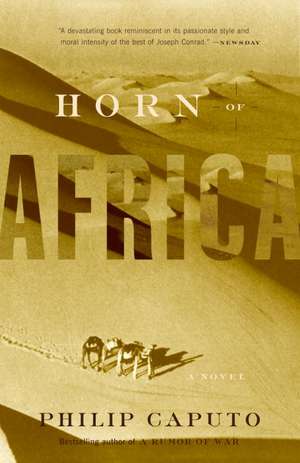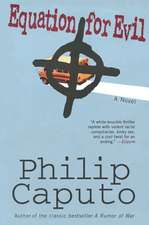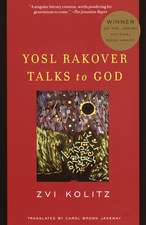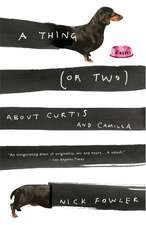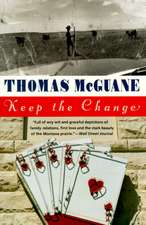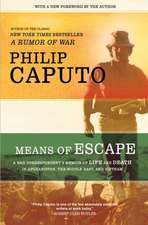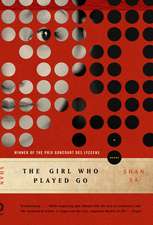Horn of Africa Horn of Africa Horn of Africa Horn of Africa Horn of Africa: A Novel a Novel a Novel a Novel a Novel: Vintage Contemporaries
Autor Philip Caputoen Limba Engleză Paperback – 31 ian 2002
Din seria Vintage Contemporaries
-
 Preț: 109.95 lei
Preț: 109.95 lei -
 Preț: 101.80 lei
Preț: 101.80 lei -
 Preț: 96.52 lei
Preț: 96.52 lei -
 Preț: 107.46 lei
Preț: 107.46 lei -
 Preț: 91.77 lei
Preț: 91.77 lei -
 Preț: 100.35 lei
Preț: 100.35 lei -
 Preț: 111.51 lei
Preț: 111.51 lei -
 Preț: 96.11 lei
Preț: 96.11 lei -
 Preț: 96.93 lei
Preț: 96.93 lei -
 Preț: 97.34 lei
Preț: 97.34 lei -
 Preț: 111.92 lei
Preț: 111.92 lei -
 Preț: 117.87 lei
Preț: 117.87 lei -
 Preț: 95.92 lei
Preț: 95.92 lei -
 Preț: 113.56 lei
Preț: 113.56 lei -
 Preț: 101.88 lei
Preț: 101.88 lei -
 Preț: 108.09 lei
Preț: 108.09 lei -
 Preț: 115.42 lei
Preț: 115.42 lei -
 Preț: 106.04 lei
Preț: 106.04 lei -
 Preț: 90.64 lei
Preț: 90.64 lei -
 Preț: 87.84 lei
Preț: 87.84 lei -
 Preț: 99.60 lei
Preț: 99.60 lei -
 Preț: 105.41 lei
Preț: 105.41 lei -
 Preț: 99.30 lei
Preț: 99.30 lei -
 Preț: 120.26 lei
Preț: 120.26 lei -
 Preț: 103.74 lei
Preț: 103.74 lei -
 Preț: 100.98 lei
Preț: 100.98 lei -
 Preț: 100.76 lei
Preț: 100.76 lei -
 Preț: 89.19 lei
Preț: 89.19 lei -
 Preț: 115.94 lei
Preț: 115.94 lei -
 Preț: 101.24 lei
Preț: 101.24 lei -
 Preț: 125.13 lei
Preț: 125.13 lei -
 Preț: 89.50 lei
Preț: 89.50 lei -
 Preț: 132.88 lei
Preț: 132.88 lei -
 Preț: 139.63 lei
Preț: 139.63 lei -
 Preț: 93.85 lei
Preț: 93.85 lei -
 Preț: 106.45 lei
Preț: 106.45 lei -
 Preț: 89.91 lei
Preț: 89.91 lei -
 Preț: 107.92 lei
Preț: 107.92 lei -
 Preț: 77.02 lei
Preț: 77.02 lei -
 Preț: 125.21 lei
Preț: 125.21 lei -
 Preț: 99.75 lei
Preț: 99.75 lei -
 Preț: 112.11 lei
Preț: 112.11 lei -
 Preț: 83.94 lei
Preț: 83.94 lei -
 Preț: 97.15 lei
Preț: 97.15 lei -
 Preț: 105.82 lei
Preț: 105.82 lei -
 Preț: 87.13 lei
Preț: 87.13 lei -
 Preț: 111.76 lei
Preț: 111.76 lei -
 Preț: 129.78 lei
Preț: 129.78 lei -
 Preț: 100.57 lei
Preț: 100.57 lei
Preț: 119.87 lei
Nou
Puncte Express: 180
Preț estimativ în valută:
22.94€ • 23.86$ • 18.94£
22.94€ • 23.86$ • 18.94£
Carte disponibilă
Livrare economică 24 martie-07 aprilie
Preluare comenzi: 021 569.72.76
Specificații
ISBN-13: 9780375725111
ISBN-10: 0375725113
Pagini: 496
Dimensiuni: 132 x 203 x 28 mm
Greutate: 0.52 kg
Editura: Vintage Publishing
Seria Vintage Contemporaries
ISBN-10: 0375725113
Pagini: 496
Dimensiuni: 132 x 203 x 28 mm
Greutate: 0.52 kg
Editura: Vintage Publishing
Seria Vintage Contemporaries
Recenzii
“Reminiscent in its passionate style and moral intensity of the best of Joseph Conrad.”–Newsday
“A real novel stuffed with excitement and filled with sharply drawn characters.”–The New York Times
“An extraordinarily powerful novelist who works in one of the grand traditions of literature: the fiction of nightmare against the background of war and espionage.”–The Dallas Morning News
“Does not suffer in comparison with Graham Greene or Joseph Conrad. . . . An awesomely evil tale–enthralling, disgusting, utterly first-rate.” –Jim Harrison
“A real novel stuffed with excitement and filled with sharply drawn characters.”–The New York Times
“An extraordinarily powerful novelist who works in one of the grand traditions of literature: the fiction of nightmare against the background of war and espionage.”–The Dallas Morning News
“Does not suffer in comparison with Graham Greene or Joseph Conrad. . . . An awesomely evil tale–enthralling, disgusting, utterly first-rate.” –Jim Harrison
Notă biografică
Philip Caputo lives in Norwalk, Connecticut.
Extras
ONE
KHAMSIN
HE WAS THICK-CHESTED and light-haired, with sloping shoulders joined so smoothly to his neck he seemed not to have any neck at all, and a head whose size made his shoulders look narrower than they were, a wide round head which he cocked slightly forward when he walked, swinging his arms as if he meant to smash through whatever stood in his way. Just over six feet tall, he reminded you of a bear, and I do not mean some tame and shambling circus bear. The impression was heightened by his eyes, close-set in that washtub head of his, glowing an animal green and vaguely slanted by the high cheekbones he had inherited from his Scandinavian ancestors. They seldom looked to the sides, those eyes. They were almost always fixed straight ahead, and their cold green fire, like the roll of his shoulders and the swing of his tensed arms, suggested an inner turbulence straining for an outlet. His voice was level, as level as the northern prairies that had helped to form him. But it was not a dull voice. It was interesting by virtue of its unnatural calm, beneath which you caught an undertone of menace, a warning that the calm could easily burst into a rage. It aroused the expectancy, mixed with dread, of a still August day in his part of the country, when you hear in the lulled air the far-off rumble of one of those summer storms that sometimes savage the plains.
Jeremy Nordstrand was now and then mistaken for a primitive: the ex-football player, ex-infantry officer who was all claws and teeth, good only for bashing skulls or leading suicidal charges. He was much more than that, or much less: his style of barbarism made a true primitive's unconscious savagery seem refreshing by comparison. He was, though, a remarkable man. I will give him that much; he was remarkable. His claws and teeth were guided by a high, if warped, intelligence; his capacity for cunning and deception would have made him stand out in the courts of Medicean Florence; above all, he had an implacable will and a gift for making others bend to it. He bent me to it, and Moody, who at least resisted for a time, and Kasu Murrah, who righted himself near the end, when it was too late, and Osman, the old fighter who died for him. Even Muhammad Jima, a willful man himself, gave in and violated one of his people's most sacred codes. "I see things through," Nordstrand once told me, "right through to the end." I will give him that, too. He saw things through. And I am sure his determination, combined with his talent for making others do what he wanted, would have ensured him a brilliant military or political career if the fabric of his mind had not been woven on a faulty loom. I am not trying to place all the blame on him. This story may be an exorcism of sorts; but it is not an apology for the things we did and the things we allowed him to do out there. In the end, it was by choice that we bowed to Nordstrand's will, each for his own reason. Murrah because he had lost his particular faith, a loss that left him without any principles on which to make a stand; Moody because he did not know how to deal with a man like Nordstrand; Osman--a product of the past--because he had an outmoded belief in white men and a need to associate himself with their supposed powers; Jima because of ambition--he had flattered himself into thinking of Nordstrand as his own personal instrument, the device that would transform his fantasy kingdom into reality and raise him to its throne. As for myself, my reasons were no better than theirs, perhaps worse. So Nordstrand did not overthrow the inner governor--call it conscience, call it will, call it a standard of behavior--that had once ruled us. We permitted it to abdicate; we surrendered to him, and made ourselves his accomplices.
Certainly we would have been indicted if everything had happened in a place where lawyers and judges stage the little dumbshows we call justice; but it all took place in the empty desert in the midst of a revolution, neither of which allowed the slow workings of the law. Each eventually dispensed its own form of justice, crude and unfair, but forms of justice nonetheless. The last few days on the desert were the worst, racking us with agonies more exquisite than could be inflicted by the worst prison in the world. The wilderness, however, was not entirely merciless; it allowed me to escape, to bear witness, and to experience a kind of expiation. The professional moralists, from their pulpits, from their editorial offices, from their speaker's dais littered with half-eaten dinners, might say it was not a genuine expiation and call for investigating commissions, inquiries, punishments. Let them chatter. We paid whatever debt we owed. Nordstrand and Moody paid all a man can pay, Nordstrand with interest because his liability was the greatest. I took his last installment and closed his account.
Colfax was the exception. His penalty was very light: exile to an obscure province in the bureaucratic empire. He is there today, reading boring journals out of which he produces boring reports for his division chief. He will rise no further in the hierarchy. He will inhabit his stuffy little cubicle until he is pensioned off. He will never be anything more than a glorified clerk, and his name, if it is spoken at all, will be spoken only in whispers accompanied by shakes of the head and comments that he ruined his career by "overreaching." That was the word our resident in Khartoum used after I made it back to the Sudanese border.
Colfax, amid the wreckage of his career, probably regards his as the worst punishment. His career was the only important thing in his life. He belonged to "The Craft," as he liked to call his business, and the men of The Craft, as anxious to conceal their mistakes as they are their secrets, could not have afforded to have him publicly whipped. Nor could they have fired him, for he might then have felt released from his oath of silence. They had no choice but to bring him in and banish him to a dead-end job where he could be kept quiet and on a short leash. But if I had had anything to say about it, I would have made Colfax pay a great deal more. I would have made him pay and pay and pay. My revenge would have required certain scientific equipment which, I believe, has been developed by the patriotic scientists who work in the experimental laboratories in the building where Colfax now writes his pointless reports. If I could get my hands on it, I would wire it to our heads, flip the switch, and transfer to Colfax's brain some of the images engraved on mine. Then he would spend his nights with the lights on, yearning for sleep and dreading it at the same time. Then, once sleep came, he would see in troubled dreams all those butchered bodies, those smiling dead whose taut-drawn grins would not fade when he woke up in a trembling sweat.
They appear to me three or four times a week, their faces as clear and real as the pictures on my wall. There are the faces of the villagers who died in the bombing, the face of the man I killed in what is usually called the heat of battle, and the faces of the men Nordstrand killed in another kind of heat. The last trouble me most of all. Their ghosts haunt my dreams because they know I should have seen Nordstrand for what he was much sooner than I did, and done something to prevent their slaughter. Nordstrand executed them. He executed and beheaded them because he had thrown himself into the abyss, the moral abyss where a man becomes capable of anything. And I had done nothing to curb him from satisfying his violent lusts until it was too late. My own ethical antennae were blunted, blunted even before we went out there, blunted further by the months we spent living among primitive men on the African desert, eating their vile-tasting mush, drinking from wells half-dried by drought the putrid water that never slaked our thirst, while the sun clubbed us daily and the winds slapped our faces raw. Moody had taken such great care to bring enough medicines to protect us from malaria, dysentery, and hepatitis, but nothing to inoculate ourselves against the diseases of the spirit men are prey to in such places.
The frightening thing is, I know how close I came to becoming like Nordstrand. Given a few more weeks of heat, isolation, and stinking water, a few more weeks of feeling myself surrounded by a world barbarous and alien, I would have followed him in his fall; it is an awful knowledge to live with, more awful than the knowledge of death, the knowledge that you could be capable of the worst under the right circumstances. Perhaps that is another reason why Nordstrand's victims haunt me: to remind me of my capacity for evil. Whenever I see their hideously grinning mouths and blind staring eyes, I also see, in a kind of waking nightmare, the earth opening into a chasm as black as the desert when there is no moon and the dust clouds raised by the wind have extinguished the stars. I am standing at its lip, simultaneously horrified and fascinated as I watch Nordstrand plunge down, his arms outstretched, not in a plea for help, but in invitation. A terrifying dizziness comes over me.
And I would have Colfax tormented by such visions, not because that would change anything, but because it would balance the scales. Gogol once said, "I call the devil, devil, and do not dress him in a splendid costume a la Byron, and I know he wears a frock coat." Thomas Colfax wore pinstripe suits, a costume which lent authenticity to his playact role as the Cairo manager of a company called Inter-Arab Development Ltd.; but he was as much a devil as Gogol's frock-coated gentleman, so I think his life should be a living hell rather than the purgatory it is now. After all, the project--being fond of classical allusions, Colfax had code-named it Operation Atropos--was his idea. It was the child of his brain, born deformed and nurtured by that other demon, Nordstrand, into a monster that maimed or destroyed everyone it touched except its parent.
I HAVE BEGUN to ramble again. I may even be raving, with my talk of nightmares and ghosts. The doctor would probably blame it on my drinking. A man in my nervous condition, he says, should avoid the world's oldest and most reliable anesthetic. Perhaps he is right, but whiskey works a wonderful magic on me. It puts me to sleep by blurring the images of the dead whose joker grins keep me awake. In any case, the confusion in my mind is not important; the history of Operation Atropos is. And chronologically, Atropos began with the phone call from David Harris.
That was nearly two years ago, and will serve as a traditional beginning. For it was through Harris that I met Colfax, and through Colfax, the remarkable Nordstrand. It was also through Colfax that I helped to ruin Harris, who was among the operation's first casualties.
Harris and I first met in Beirut in the days before that outburst of mass homicidal mania known as the Lebanese Civil War. Ours was one of those expatriate friendships, which do not arise out of a commonality of needs and interests but out of shared circumstances. In our case, we were Americans who had been thrown together in a strange part of the world. Harris was then Middle East representative for the Endicott Bank, which was seeking its share of the billions generated by Arabian oil; I was a correspondent for the Los Angeles Post, which was seeking its share of the Middle East's other natural resources: the headlines generated by endless wars, terrorism, and human suffering.
During that time in Beirut, before the war, before the phone call, we met fairly often. Harris was entertaining company, although he tended to be too confessional after a couple of drinks. He was a short, slight man with dreams of riches as big as he was small and a pretense of taking nothing seriously, including his dreams. One afternoon on the veranda of the St. George Hotel, he told me he regarded life as a circus and most men as mere performers who spent their lives jumping through hoops. This came in a tone of genial cynicism, as if he were some jaded old Levantine trader who had seen so much folly and greed that the human condition amused rather than saddened him. I said I found his views neither original nor interesting. Ignoring me, he went on, describing about how he had jumped through "the Jewish liberal hoop" in his early twenties, marching with blacks in Mississippi and working with the AID program in Laos. Both experiences had disillusioned him and led him into a brief flirtation with the New Left--"the Jewish radical hoop." Finally, nearing the watershed of thirty, he had responded to an opposing call in what he termed his Semitic genes, joined Endicott, and begun to jump through "the Jewish banker hoop."
It was one of the few times I had heard him emphasize his ancestry, about which he was confused and self-conscious. His father, the descendant of a Russian Jew, had changed the family's original name after he'd become a successful executive. He had married an English Catholic while serving in London during the Second World War. The couple, unable to decide in which religion to raise their son, made a shaky compromise: Harris attended Hebrew school as a boy, then went on to Georgetown for a healthy dose of Jesuit Catholicism. Unsure of which God to worship, Harris had decided to worship none at all. He maintained his atheism until joining Endicott, a citadel of WASPism that caused him to undergo a Pauline conversion. He told the personnel director he was a Protestant, a fiction to which his sandy hair, blue eyes, and aquiline features gave a convincing, if false, testimony.
We were drinking gin and tonics that afternoon in Beirut. Holding his glass in one hand, Harris swept the other across the serene bay as if he owned all the ships anchored in it, and described his vision of the future. It was a rather vague vision, which made it all the more captivating.
KHAMSIN
HE WAS THICK-CHESTED and light-haired, with sloping shoulders joined so smoothly to his neck he seemed not to have any neck at all, and a head whose size made his shoulders look narrower than they were, a wide round head which he cocked slightly forward when he walked, swinging his arms as if he meant to smash through whatever stood in his way. Just over six feet tall, he reminded you of a bear, and I do not mean some tame and shambling circus bear. The impression was heightened by his eyes, close-set in that washtub head of his, glowing an animal green and vaguely slanted by the high cheekbones he had inherited from his Scandinavian ancestors. They seldom looked to the sides, those eyes. They were almost always fixed straight ahead, and their cold green fire, like the roll of his shoulders and the swing of his tensed arms, suggested an inner turbulence straining for an outlet. His voice was level, as level as the northern prairies that had helped to form him. But it was not a dull voice. It was interesting by virtue of its unnatural calm, beneath which you caught an undertone of menace, a warning that the calm could easily burst into a rage. It aroused the expectancy, mixed with dread, of a still August day in his part of the country, when you hear in the lulled air the far-off rumble of one of those summer storms that sometimes savage the plains.
Jeremy Nordstrand was now and then mistaken for a primitive: the ex-football player, ex-infantry officer who was all claws and teeth, good only for bashing skulls or leading suicidal charges. He was much more than that, or much less: his style of barbarism made a true primitive's unconscious savagery seem refreshing by comparison. He was, though, a remarkable man. I will give him that much; he was remarkable. His claws and teeth were guided by a high, if warped, intelligence; his capacity for cunning and deception would have made him stand out in the courts of Medicean Florence; above all, he had an implacable will and a gift for making others bend to it. He bent me to it, and Moody, who at least resisted for a time, and Kasu Murrah, who righted himself near the end, when it was too late, and Osman, the old fighter who died for him. Even Muhammad Jima, a willful man himself, gave in and violated one of his people's most sacred codes. "I see things through," Nordstrand once told me, "right through to the end." I will give him that, too. He saw things through. And I am sure his determination, combined with his talent for making others do what he wanted, would have ensured him a brilliant military or political career if the fabric of his mind had not been woven on a faulty loom. I am not trying to place all the blame on him. This story may be an exorcism of sorts; but it is not an apology for the things we did and the things we allowed him to do out there. In the end, it was by choice that we bowed to Nordstrand's will, each for his own reason. Murrah because he had lost his particular faith, a loss that left him without any principles on which to make a stand; Moody because he did not know how to deal with a man like Nordstrand; Osman--a product of the past--because he had an outmoded belief in white men and a need to associate himself with their supposed powers; Jima because of ambition--he had flattered himself into thinking of Nordstrand as his own personal instrument, the device that would transform his fantasy kingdom into reality and raise him to its throne. As for myself, my reasons were no better than theirs, perhaps worse. So Nordstrand did not overthrow the inner governor--call it conscience, call it will, call it a standard of behavior--that had once ruled us. We permitted it to abdicate; we surrendered to him, and made ourselves his accomplices.
Certainly we would have been indicted if everything had happened in a place where lawyers and judges stage the little dumbshows we call justice; but it all took place in the empty desert in the midst of a revolution, neither of which allowed the slow workings of the law. Each eventually dispensed its own form of justice, crude and unfair, but forms of justice nonetheless. The last few days on the desert were the worst, racking us with agonies more exquisite than could be inflicted by the worst prison in the world. The wilderness, however, was not entirely merciless; it allowed me to escape, to bear witness, and to experience a kind of expiation. The professional moralists, from their pulpits, from their editorial offices, from their speaker's dais littered with half-eaten dinners, might say it was not a genuine expiation and call for investigating commissions, inquiries, punishments. Let them chatter. We paid whatever debt we owed. Nordstrand and Moody paid all a man can pay, Nordstrand with interest because his liability was the greatest. I took his last installment and closed his account.
Colfax was the exception. His penalty was very light: exile to an obscure province in the bureaucratic empire. He is there today, reading boring journals out of which he produces boring reports for his division chief. He will rise no further in the hierarchy. He will inhabit his stuffy little cubicle until he is pensioned off. He will never be anything more than a glorified clerk, and his name, if it is spoken at all, will be spoken only in whispers accompanied by shakes of the head and comments that he ruined his career by "overreaching." That was the word our resident in Khartoum used after I made it back to the Sudanese border.
Colfax, amid the wreckage of his career, probably regards his as the worst punishment. His career was the only important thing in his life. He belonged to "The Craft," as he liked to call his business, and the men of The Craft, as anxious to conceal their mistakes as they are their secrets, could not have afforded to have him publicly whipped. Nor could they have fired him, for he might then have felt released from his oath of silence. They had no choice but to bring him in and banish him to a dead-end job where he could be kept quiet and on a short leash. But if I had had anything to say about it, I would have made Colfax pay a great deal more. I would have made him pay and pay and pay. My revenge would have required certain scientific equipment which, I believe, has been developed by the patriotic scientists who work in the experimental laboratories in the building where Colfax now writes his pointless reports. If I could get my hands on it, I would wire it to our heads, flip the switch, and transfer to Colfax's brain some of the images engraved on mine. Then he would spend his nights with the lights on, yearning for sleep and dreading it at the same time. Then, once sleep came, he would see in troubled dreams all those butchered bodies, those smiling dead whose taut-drawn grins would not fade when he woke up in a trembling sweat.
They appear to me three or four times a week, their faces as clear and real as the pictures on my wall. There are the faces of the villagers who died in the bombing, the face of the man I killed in what is usually called the heat of battle, and the faces of the men Nordstrand killed in another kind of heat. The last trouble me most of all. Their ghosts haunt my dreams because they know I should have seen Nordstrand for what he was much sooner than I did, and done something to prevent their slaughter. Nordstrand executed them. He executed and beheaded them because he had thrown himself into the abyss, the moral abyss where a man becomes capable of anything. And I had done nothing to curb him from satisfying his violent lusts until it was too late. My own ethical antennae were blunted, blunted even before we went out there, blunted further by the months we spent living among primitive men on the African desert, eating their vile-tasting mush, drinking from wells half-dried by drought the putrid water that never slaked our thirst, while the sun clubbed us daily and the winds slapped our faces raw. Moody had taken such great care to bring enough medicines to protect us from malaria, dysentery, and hepatitis, but nothing to inoculate ourselves against the diseases of the spirit men are prey to in such places.
The frightening thing is, I know how close I came to becoming like Nordstrand. Given a few more weeks of heat, isolation, and stinking water, a few more weeks of feeling myself surrounded by a world barbarous and alien, I would have followed him in his fall; it is an awful knowledge to live with, more awful than the knowledge of death, the knowledge that you could be capable of the worst under the right circumstances. Perhaps that is another reason why Nordstrand's victims haunt me: to remind me of my capacity for evil. Whenever I see their hideously grinning mouths and blind staring eyes, I also see, in a kind of waking nightmare, the earth opening into a chasm as black as the desert when there is no moon and the dust clouds raised by the wind have extinguished the stars. I am standing at its lip, simultaneously horrified and fascinated as I watch Nordstrand plunge down, his arms outstretched, not in a plea for help, but in invitation. A terrifying dizziness comes over me.
And I would have Colfax tormented by such visions, not because that would change anything, but because it would balance the scales. Gogol once said, "I call the devil, devil, and do not dress him in a splendid costume a la Byron, and I know he wears a frock coat." Thomas Colfax wore pinstripe suits, a costume which lent authenticity to his playact role as the Cairo manager of a company called Inter-Arab Development Ltd.; but he was as much a devil as Gogol's frock-coated gentleman, so I think his life should be a living hell rather than the purgatory it is now. After all, the project--being fond of classical allusions, Colfax had code-named it Operation Atropos--was his idea. It was the child of his brain, born deformed and nurtured by that other demon, Nordstrand, into a monster that maimed or destroyed everyone it touched except its parent.
I HAVE BEGUN to ramble again. I may even be raving, with my talk of nightmares and ghosts. The doctor would probably blame it on my drinking. A man in my nervous condition, he says, should avoid the world's oldest and most reliable anesthetic. Perhaps he is right, but whiskey works a wonderful magic on me. It puts me to sleep by blurring the images of the dead whose joker grins keep me awake. In any case, the confusion in my mind is not important; the history of Operation Atropos is. And chronologically, Atropos began with the phone call from David Harris.
That was nearly two years ago, and will serve as a traditional beginning. For it was through Harris that I met Colfax, and through Colfax, the remarkable Nordstrand. It was also through Colfax that I helped to ruin Harris, who was among the operation's first casualties.
Harris and I first met in Beirut in the days before that outburst of mass homicidal mania known as the Lebanese Civil War. Ours was one of those expatriate friendships, which do not arise out of a commonality of needs and interests but out of shared circumstances. In our case, we were Americans who had been thrown together in a strange part of the world. Harris was then Middle East representative for the Endicott Bank, which was seeking its share of the billions generated by Arabian oil; I was a correspondent for the Los Angeles Post, which was seeking its share of the Middle East's other natural resources: the headlines generated by endless wars, terrorism, and human suffering.
During that time in Beirut, before the war, before the phone call, we met fairly often. Harris was entertaining company, although he tended to be too confessional after a couple of drinks. He was a short, slight man with dreams of riches as big as he was small and a pretense of taking nothing seriously, including his dreams. One afternoon on the veranda of the St. George Hotel, he told me he regarded life as a circus and most men as mere performers who spent their lives jumping through hoops. This came in a tone of genial cynicism, as if he were some jaded old Levantine trader who had seen so much folly and greed that the human condition amused rather than saddened him. I said I found his views neither original nor interesting. Ignoring me, he went on, describing about how he had jumped through "the Jewish liberal hoop" in his early twenties, marching with blacks in Mississippi and working with the AID program in Laos. Both experiences had disillusioned him and led him into a brief flirtation with the New Left--"the Jewish radical hoop." Finally, nearing the watershed of thirty, he had responded to an opposing call in what he termed his Semitic genes, joined Endicott, and begun to jump through "the Jewish banker hoop."
It was one of the few times I had heard him emphasize his ancestry, about which he was confused and self-conscious. His father, the descendant of a Russian Jew, had changed the family's original name after he'd become a successful executive. He had married an English Catholic while serving in London during the Second World War. The couple, unable to decide in which religion to raise their son, made a shaky compromise: Harris attended Hebrew school as a boy, then went on to Georgetown for a healthy dose of Jesuit Catholicism. Unsure of which God to worship, Harris had decided to worship none at all. He maintained his atheism until joining Endicott, a citadel of WASPism that caused him to undergo a Pauline conversion. He told the personnel director he was a Protestant, a fiction to which his sandy hair, blue eyes, and aquiline features gave a convincing, if false, testimony.
We were drinking gin and tonics that afternoon in Beirut. Holding his glass in one hand, Harris swept the other across the serene bay as if he owned all the ships anchored in it, and described his vision of the future. It was a rather vague vision, which made it all the more captivating.
